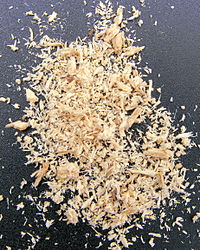
Photo from wikipedia
Cell-penetrating peptides (CPPs) have been widely used as vehicles for delivering therapeutic molecules to the site of action. Apart from their delivering potential, the biological effects of CPPs have not… Click to show full abstract
Cell-penetrating peptides (CPPs) have been widely used as vehicles for delivering therapeutic molecules to the site of action. Apart from their delivering potential, the biological effects of CPPs have not been explored in detail. JTS-1 is a CPP that has been reported to have gene delivery functions, although its biological role is yet to be determined. Hence, in this study, we revealed the biological mechanism such as its uptake mechanism and immunogenic potential and function using primary human tenon fibroblast (TF) cells collected from patients undergoing glaucoma trabeculectomy surgery. Our results showed that the JTS-1 peptide has an α-helical structure and is nontoxic up to 1 μM concentration. It was found to be colocalized with early endosome (Rab5), recycling endosome (Rab7), and Rab11 and interacted with major histocompatibility complex (MHC) class I and II. The peptide also affected actin polymerization, which is regulated by cofilin phosphorylation and ROCK1 localization. It also inhibited TF cell proliferation. Therefore, the JTS-1 peptide could be used as a possible therapeutic agent for modifying the fibrosis process, where TF proliferation is a key cause of surgery failure.
Journal Title: ACS Omega
Year Published: 2022
Link to full text (if available)
Share on Social Media: Sign Up to like & get
recommendations!